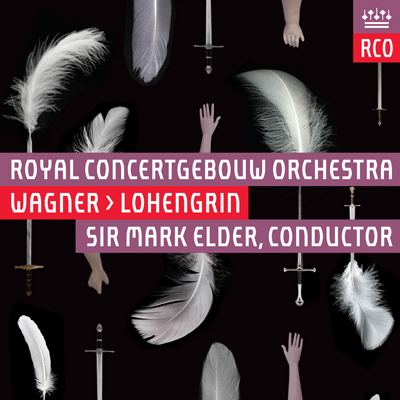Hence the appeal of recording a concert performance. This CD set was edited from two such performances in Amsterdam’s Concertgebouw on December 18 and 20, 2015. The performance was semi-staged, i.e., done without costumes and sets. Some evocative lighting was employed. Characters made entrances and exits through various doors, and characters and (I gather) brass players appeared on balconies.
An injured shoulder forced the scheduled conductor Andris Nelsons to cancel. Fortunately, the conductor who stepped in on a week’s notice, Mark Elder, is an experienced hand not only with opera but also symphonic music, always a crucial element in a Wagner opera. Elder was music director of the English National Opera in 1979-93, led the Rochester Philharmonic in 1989-94, and, since 1999, has been at the helm of the renowned Hallé Orchestra (in Manchester, England). Here he moves things along at a generally bracing clip, yet he also gives the more “spiritual” elements of the score their due, as in the beautifully sustained yet forward-moving prelude to Act 1. The entire performance takes just about as long as the recently released 1963 recording—from a staged performance in Munich—by renowned Wagner specialist Hans Knappertsbusch. (See my review here.)
The singers all bring clarity and dramatic point to the sung words. Most of them are native German-speakers or Scandinavians, but the Russian Evgeny Nikitin and the South Korean Samuel Koun articulate the words well, too. Unfortunately, most of the cast members are afflicted at times by a certain roughness of sound, often combined with a slow and somewhat wide vibrato, presumably the result of singing heavy roles in large theaters over some years. Camilla Nylund manages to find a clean line at the beginning of the bridal-chamber scene, only to regain her slight wobble the moment Elsa gets agitated.
The best of the singers, for my taste, is Klaus Florian Vogt (Lohengrin), whose singing is somewhat unusual in timbre—very focused, a bit like the Evangelist in a Bach Passion—but consistently clear and controlled, as if this character floats in some higher realm than the rest. (One of his other major roles has been Mozart’s Tamino. He has recently added Tannhäuser.) Vogt’s remarkable use of a light, lyrical, utterly unforced tone conveys many nuances of feeling, including resignation, confident determination, and purity of intent. He phrases beautifully. (He was a professional trumpet player before becoming an opera singer.)
The combined choral groups sound absolutely marvelous. Like Vogt, they are a balm to the ear—maybe they, too, are heaven-blessed?
Katarina Dalayman, in the complex role of Ortrud, manages to combine (or alternate, really) viciousness and insinuating sweetness. She is, almost inevitably, not always a balm to the ear, but she gives quite a portrayal!
The Concertgebouw Orchestra plays, as one might expect, superbly throughout. There is no scrambling when things get excited, and no unsteadiness during slower, reflective passages. What a relief from many opera recordings made during a minimally rehearsed, somewhat helter-skelter performance!
A work as complex as this must be the devil to record during a performance (whether staged or not). Occasionally a singer here is not captured fully by the microphones, and the orchestra’s sonority often lacks the subtle glamor that listeners have come to expect from symphonic recordings made by this same orchestra in this same hall. I also wonder whether some of the singers would have been less tempted into vocal vehemence and high intensity if the orchestra had been tamed by being tucked away in a pit, rather than playing right behind them on the stage. But “opera in concert” seems to be a compromise that we are fated to live with nowadays, even on recordings.
Complete libretto, an excellent translation, and a brief essay emphasizing the work’s historical references. Also some photos, which reveal that a barefoot male dancer made an entrance—down the aisles—in the silent role of the long-awaited savior-swan. He wore a white dinner jacket and trousers, with white ruffles (suggestive of feathers) on the back of the jacket, and he was carrying the head and neck of a swan (made of cloth). More details about the semi-staging can be found in a review of the first of the two performances, at Bachtrack.com.
This recording and Woldemar Nelsson’s (Bayreuth 1982) are both available online through the Naxos Music Library. This one is also on YouTube, in whole and in segments: here is Act 1 (jump to minute 39 to hear Lohengrin thank his beloved swan).
Despite the many strengths of this recording, especially its tenor, the choral singing, and the orchestral playing, I would continue to recommend as a first choice the Kempe studio recording. It is one of the few that restore a five-minute chunk of Act 3: a stirring and operatically effective (almost Italianate) ensemble after Elsa faints. The singing of all the roles in that famous recording is generally firm and youthful. Most of all, Elisabeth Grümmer sings the role of Elsa cleanly throughout. And Christa Ludwig portrays Ortrud with a seductive sweetness that the listener—like, alas, Elsa—may find impossible to resist.
Ralph P. Locke
The above review is a lightly revised version of one that first appeared in American Record Guide and appears here by kind permission.
Ralph P. Locke is emeritus professor of musicology at the University of Rochester’s Eastman School of Music. Six of his articles have won the ASCAP-Deems Taylor Award for excellence in writing about music. His most recent two books are Musical Exoticism: Images and Reflections and Music and the Exotic from the Renaissance to Mozart (both Cambridge University Press). The first is now available in paperback, and the second soon will be (and is also available as an e-book).
